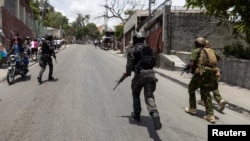Haitian Prime Minister Garry Conille left Port-au-Prince on Friday to travel to Washington and New York, as freshly deployed Kenyan police officers began patrolling the city as part of a U.N.-backed mission to battle armed gangs that have taken over the capital.
Conille's office said he would travel with Foreign Minister Dominique Dupuy, Finance Minister Ketleen Florestal and Chief of Staff Nesmy Manigat, while Justice Minister Carlos Hercule would stay as acting prime minister on his behalf.
"The delegation will have important work meetings with officials from international financial institutions, among others. It will also inspect Haiti's embassy in Washington," theoffice said, without giving further details.
A spokesperson for the U.S. National Security Council said Deputy National Security Advisor Jon Finer would meet with Conille on Monday.
The United States is the principal financial backer of a Kenya-led international security force the United Nations has ratified be sent to Haiti to help its police battle armed gangs that have plunged the country into a humanitarian crisis.
Haiti's former government first requested the force in 2022, and a first deployment of Kenyan police arrived this week, although it is unclear when the rest of the force — expected to number over 2,500 — is set to arrive.
As armed khaki-clad Kenyan police in bullet-proof jackets and helmets patrolled the city in black armored vans, Port-au-Prince residents said they hoped the force could stop the indiscriminate killings and allow business to restart.
"We need peace. If the Kenyan police forces are here, it's so we can return to the lives we used to have. We hope they've come to work seriously," said resident Kloud Dine.
"We need the Kenyans here a while because the gang members make us suffer too much," added Louise Baret, a painter. "Enough is enough."
In a video shared on social media on Wednesday, gang leader Jimmy "Barbecue" Cherizier rallied armed men, telling them to fire on Kenyan police and pledging to fight to the death: "I don't care if they are white or black. If they're not Haitian and they're on Haitian soil, they're invaders," he said.
Over half a million people have fled their homes due to the violence, and around half the population is going hungry.





